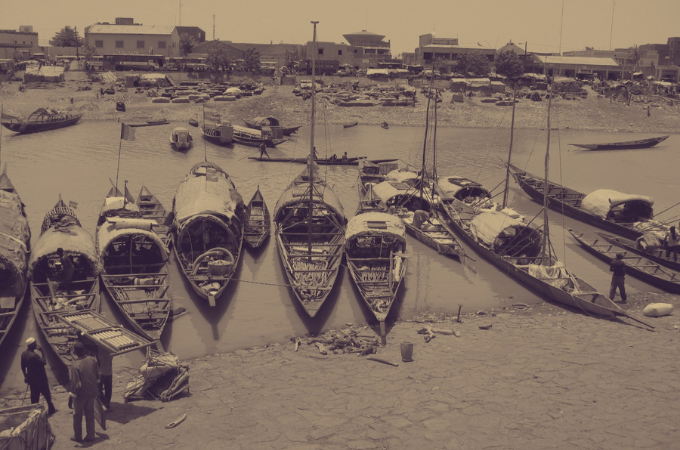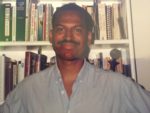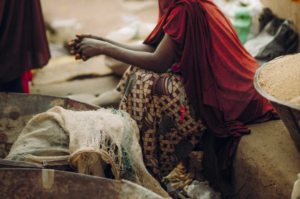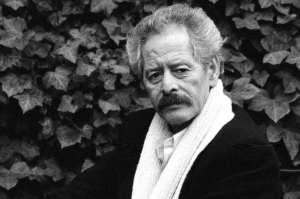
i.
1387. Niani, Mali.
The Mansa, the emperor of the Mali Empire, stood facing west toward the sea. A single unmanned ship, the only one to survive the expedition, was docked at the mouth of the Senegal River at the port town of Banjul.
“Find the mariners,” the Mansa ordered the vizier, and looked once again to the west, trying to imagine the fate of his only son.
ii.
Captain Amadou Dembele pulled a small sack from beneath his shirt and weighed it in the palm of his hand. The gold dust would not go as far as he needed, but it would have to do. He needed camels, food, and directions to the capital, but most of all he needed time. He slipped the sack beneath his shirt and hurried between the market stalls of the seaport in search of supplies, ignoring the gossip about the lone ship. Dembele followed the road to the outskirts of the market where he found the camel merchants. A deal was struck, and he set off, covering his face to avoid the dust of the road and the gaze of those who might recognize him.
Ten days later, Dembele entered Niani’s bustling central marketplace. He found a small tavern filled with the aroma of grilled fish and sat in a corner, facing the entrance. The owner brought him coffee and a small plate of Nile perch and bread, and Dembele listened as the man spoke of how the emperor had not appeared in public since the disappearance of the prince. Outside, a company of soldiers prepared to set out for the port of Banjul, but before they could embark, they learned that a mariner had entered Niani and was searching the marketplace for someone who might arrange an audience with the vizier. They found Dembele as he exited the tavern and escorted him to the palace.
iii.
A hush fell upon the room as the Mansa entered. The vizier stood at his side.
“Come closer,” the Mansa said. “What is your name?”
“I am Amadou Dembele,” said the captain.
“Captain Dembele, what do you know of the fleet and how is it that your ship returned while the others were lost?”
“As you know, Mansa, two hundred ships set sail to see if we might measure the expanse of the Atlantic. We travelled for three days and three nights, and on the morning of the fourth day, we came upon a powerful current in the ocean like a swift-running river. All the other ships, including the ship that carried the prince, were swept to the west and disappeared.”
“How did your ship come to survive?”
“We were instructed to fall back so that the court artists could capture the fleet,” said Dembele ruefully. “When we saw what was happening, we tried to follow but were ordered to go no farther.”
“Who gave the order?”
“The Master of the Deep,” said the captain. “After we saw his signal, we backed the mainsail and came to a stop.”
Captain Dembele pressed a hand to his temple as if only now understanding the consequences of failing to pursue the fleet that carried his own son, Abdoulaye, who travelled on one of the sister ships.
“And your crew, where are they now?” said the vizier.
“They await my return not far from the port town.”
The vizier waited expectantly.
“They are at the Wayfarer’s Inn in a village to the northwest. But I don’t know how long I can hold them. If they don’t hear from me soon, they’ll hire out to other ships that sail along the coasts.”
The vizier nodded to the soldiers who had brought Dembele to the court. The vizier began to dismiss the captain when the captain interrupted.
“If I may,” said Dembele, “I have a request.”
“What is it?”
“I ask that the Mansa permit me to take my crew and perhaps another ship and follow the path of the expedition,” Dembele said.
“Your request will be taken under advisement,” the vizier said when the Mansa did not respond.
iv.
“What would you have me do?” Prince Sundiata said, his eyes cast down. Father and son spoke over the chessboard. Sundiata, a young man of twenty-three, rarely bested him, but the Mansa knew the heart of the lion, the “Jatah,” beat within his son.
“You, father, are the empire,” Sundiata said. “When you made your Hajj, the value of gold fell for months afterwards because it flowed like water from the generous hand of the Mansa. It was you who championed the reforms that made their lives better: that created the legislature representing the different clans; that made land available to all who would work it; and that governed the fair treatment of slaves and prisoners of war; that addressed grievances among the clans; and set rates of exchange for goods. But most of all it was you who brought peace to the land.
“Let me, for a time, have my own kingdom, the kingdom of the sea. The Imams say a good son is one who protects his father’s kingdom while also expanding it. Let me go to the west and see what we may find. For nearly six years, the scholars plotted a route, gauging the known world in an effort to see what we might find. We have gone as far as we can within the limits of scholarship. Now let us test what we think we know. In the name of the Mansa, and in the memory of his queen, Sakina, may her name never be forgotten, let me return having extended the reach of the empire, if only the empire of knowledge.”
The Mansa was unpersuaded. “You will accompany the fleet as far as Bamako,” he said. “Then you will disembark and return to the capital.”
When he was still little more than a boy, the Mansa – known then only as Abubakari –was forced to flee to the court of a foreign king to escape his uncle, the formidable Massa Ko Sata, the former general of the empire’s army who sought to take Abubakari’s life in order to claim the throne for himself. Even in exile, Abubakari was pursued. Year after year he ran. It was during a stay in an Amazigh encampment in the Sahara that he met Sakina, the daughter of an Amazigh elder. Sundiata was born a year later. The seer prophesized that Sundiata would one day rule over a kingdom surpassing even that of his father. Abubakari’s affection for Sakina made him relax his vigilance so that he and Oumar, his companion who would one day become the vizier, remained among the Amazigh longer than they had anywhere during their long years of exile.
In his third year with Sakina, Abubakari learned that a stranger had inquired about him as he and Oumar were returning from a trip to Marrakesh. When he approached the outskirts of the family enclosure, they could make out the silhouette of a man holding Sundiata by the hand. Abubakari did not know it, but Sakina already lay dead. It was Oumar, known as “the Crocodile,” who advised patience, so they waited until nightfall. Then beneath a full moon, Abubakari and Oumar slew one assassin as he dozed. A second they forced to draft a letter to Ko Sata, saying their work has been accomplished and that Abubakari, son of the former emperor, was dead. The messenger sealed the note with his ring.
After they were certain the message had been delivered, Abubakari and Oumar waited another six months, certain that Ko Sata would not soon let down his guard. Then, disguised as Moroccan tradesmen they travelled to Niani and awaited their chance as Ko Sata returned under light guard from a wine-soaked visit to a lover Abubakari and Oumar waited anxiously in the shadows. “Forget surviving this fight,” Oumar whispered, “and maybe then we will live.”
Through an elaborate ruse, Oumar managed to separate Ko Sata from his guards and within a warren of alleys in Niani’s market district where Abubakari cornered him. Still, Abubakari would have died that day but for the sudden presence of a boy. His name was Drissa Kante, and he was Massa Ko Sata’s son. The boy had followed his father through the twists and turns of the alleys, eager to watch the awe that the presence of his father inspired. It was when Drissa Kante rounded the corner, drawing his father’s attention that Abubakari cast the knife, catching the giant off guard. Ko Sata died never knowing who struck the blow.
Abubakari went on to become the emperor over four hundred cities, towns, and villages and the richest man the world had ever known.
“Allah creates all,” Sundiata said as he and the Mansa stood on the bank of the River Niger, the ships waiting at anchor. The celebration of the expedition had begun at dawn with wrestlers, dancers and musicians performing until noon when the Imams blessed the ships.
Father and son pressed their foreheads to the riverbank and prayed for a safe journey. Knowing they would be separated until Sundiata reached Bamako and returned to the palace while the fleet continued to the Atlantic, the Mansa placed his hands on Sundiata’s shoulders.
“Who are you?” said the Mansa. “Speak the words.”
“I am Sundiata,” the prince said, his face aglow, “son of Emperor Abubakari II of Mali, Lord Protector of the Twelve Doors of Mali: of Bambougou, of the Bozo, of Djedeba, of Do, of Jalo, of Kaniaga, of Kri, of Oualata, of Siby, of Tabon, of Toron, of Zaghari; of the three freely allied states of Mali, Mema, and Wagadou. I am the son of Sakina in whose name I draw breath and whose spirit watches over me.” Then Sundiata bowed and boarded the ship.
v.
Two days after Captain Dembele’s audience, the Mansa waited in his rooms, a chess piece in his fist. There was a tap at his door, and the Mansa slipped the queen into the pocket of his tunic.
“The vizier tells me you would not leave unless I saw you,” said the Mansa to Captain Dembele. “Do you know why I agreed to see you?”
“Because it was I who allowed the prince to accompany the expedition,” said Dembele under the Mansa’s stare.
“I did not recall until later,’ the Mansa said, “it was you who stood on the riverbank when the prince embarked at the River Niger.”
“I knew you had instructed him to embark at Timbuktu,” said Dembele. “Then sail west with the fleet and disembark at Bamako. But it would have been necessary to tie him and carry him off to make him leave the ship. Even then he would have found a way,” Dembele said, “and if he would have found a way, better to have him sail with one of the sister ships captained by a man I trust than to hide out on one of the ships with an untried captain.”
“If it would have taken force then you should have done so,” said the Mansa, his voice raised. The vizier opened the door and looked in upon the men, then at the wave of the Mansa’s hand closed the door again.
The Mansa knew it to be true. Sundiata would have found a way to board one of the ships if he was determined to accompany the fleet; however, this did not prevent the Mansa from imagining the captain bound like a prisoner of war.
“Why did you come to Niani?” the Mansa said. “You could have avoided any accusation of negligence or complicity in the disappearance of the prince by staying away.”
“I came because my son was also on the expedition,” said Dembele. Seeing the pain in the man’s face the Mansa’s anger cooled. “I can follow them if you allow us the ship to do so. I know where the ships scattered to the west.” When Dembele mentioned the ships, a parade of horrors marched through the Mansa’s mind. Imagining that Sundiata had met his end was beyond comprehension, yet it was somehow easier to think that Sundiata was already lost to him than to imagine him alive but suffering any number of hardships.
Dembele looked intently at the Mansa. “And they are companions, our sons,” Dembele said.
The men held each other’s gaze. For the Mansa, it was like someone taking a painting from his own wall and presenting it to him so that he could see it for the first time. Something that he had known and understood just below the level of consciousness. Of course, he is my son, the Mansa thought. But what he meant by this even he was not certain: perhaps that he knew his own son so of course, he was aware of this; or perhaps he meant that the long brotherhood that he had with the Crocodile, a man who had risked his life for the Mansa too many times to name and for whom the Mansa would, in turn, give his life, if necessary. Isn’t it only a small step from this brotherhood to the brotherhood of which Dembele spoke? Still, the Mansa struggled to understand how the young men came to know one another.
“They met on the prince’s first trip along the southern coast,” said Dembele.
“And Sundiata insisted on travelling with the expedition–”
“Because of Abdoulaye?” said Dembele. “That is my son. Perhaps, in part, but more than anything the prince was eager to see with his own eyes what he had studied for so long. I came to tell you of the ships,” said Dembele. “I believe the prince is alive.”
Images of Sundiata safe and unharmed rose up in the Mansa’s mind. Could it be? He would like to believe so. Two months had passed since Sundiata’s disappearance. It was only when there was no word of him by the second day did the Mansa think to interrogate the Bamako roustabouts. The men put aside their songs long enough to tell what they knew. The prince never disembarked at Bamako. Not that they saw. Then the Mansa understood; he remembered the expression on Sundiata’s face at their last meeting: a mixture of apprehension and elation. At the time, the Mansa thought only of how he had denied Sundiata’s wish to accompany the fleet. But later he understood that Sundiata had planned to go to sea all along; the fear and elation in the prince’s face were in response to the adventure to come.
The Mansa stood and walked to the window, a far-off look in his eyes. Outside the sun was dying in the west.
“Do you know the story of Īsā ibn Maryam, captain?”
“The Christians believe he came to save the people.”
“Yes,” said the Mansa. “That God sent his son as the Lamb of God.” He faced Dembele. “Isn’t it strange to send a son on such a journey?” And death the only means of return, the Mansa thought. And have I done the same? Allowed my son to travel on a journey from which return could only mean death? Will I see him again only in the spirit world or the shadowland separating this world from the next?
Captain Dembele sensed something shift in the Mansa the way the weather can shift, subtly at first then all at once. “I’ve heard that you’ve made Hajj,” said Dembele. “Is it true?”
“It is,” said the Mansa. “Two years ago, we made Hajj at the prince’s suggestion. He wanted to see for himself what had been written in the holy books. I suppose it’s the same as now, but instead of the sea he wanted to visit the House of God. We set off with a thousand men. Outside Mecca, most of the company camped in the desert while the rest lodged overnight in a pilgrims’ inn. The next morning, we changed into the simple garments of the pilgrims and ate bread and fish. We did our best to blend in along the pilgrim road. By late morning, the sun was blazing. We were taken by the ebullience of the people, their eager anticipation of the trip after years of planning; a son sent to represent his village; two matrons, sisters, traveling together in the twilight of their years; whole extended families traveling together; groups of brothers come in the name of their deceased father and mother, one such group of jovial men called themselves the Bachelors though several of them were married and the fathers of many sons and daughters.
“After hours of walking on the road we made the final turn toward the House of God. There the long line slowed to a crawl, and we wound our way toward the gate. It was then that I wondered about the wisdom of the trip. We were moving shoulder to shoulder, thousands of us pressed together. The prince and I were separated from our retinue and for a moment from each other. We struggled and finally succeeded in finding one another again, reaching out our hands and grabbing one another as everyone pushed to pass beneath the arch of the gate.
“An hour later we had moved only a few feet and I thought I might succumb beneath the heat of the sun and the crush of the crowd, but then Sundiata released my hand and did something I could never have guessed: he cupped his hands around his mouth and began to sing. He sang the azan over the heads of the people. He sang as if he were speaking directly of some secret thing that he seemed always to hide away in his heart and here it was revealed for all to hear. He sang without shame, with joy in the open air, as if he were telling the world of some beloved, and because what he sang was beloved it was beautiful.
“Little by little the pilgrims stopped and fell silent, and one after another fell to their knees and Sundiata’s voice flowed over us. I marvelled at the sight: here was my son but for the first time I saw him as something other than my son, and so I too sank down to my knees and let the song wash over me. When his song came to an end, somehow, we all made room for one another and we bowed down, facing the House of God, and we prayed as a cooling breeze passed above us.”
“May I ask what you prayed for?”
“I gave thanks for Sakina, my wife,” the Mansa said. “At that moment I saw that it was her acceptance of me that made this life possible. Sakina who gave me hope that exile could come to an end even if I never returned to Niani, that I could make a home wherever I found myself. When we finally rose, the crowd moved swiftly, hungry to attain the House of God, and we passed beneath the gate and entered, walking shoulder-to-shoulder we made the tawaf, turning like a gyre around the Kaaba, swiftly at first, then slowly, solemnly. Seven times we made the winding circuit.
“During the course of the circuit I forgot myself. I was no longer the Mansa. No longer Abubakari. I was empty, part of this great turning, and I surrendered to it. It was not unlike war when we move as one to break the will of the enemy. But here there was no enemy, only the people moving together along the twisting and turning path toward the centre as through a labyrinth.
“At one point, I stopped and watched the people as they moved, the dust kicking up to the sky. When we finally reached the centre, a flock of birds passed to the east, moving like grains of golden sand in the air, stretching and contracting again. I imagined I saw every grain of gold in the empire, every grain of gold dust in the storehouses of Bambuk and Bure flying above me in the air, and I felt free and light as if whatever it was that powered the engine pumping in my chest was free to fly as the birds that flew like gold dust in the air.
“Later Sundiata and I joined the retinue and the days passed in a whirlwind. We drank together from the well of Zamzam, then gathered the skirts of our tunics and ran with abandon between the hills of Safa and Marwah until the soles of our feet cracked and bled. We slept for a night on the plain of Muzdalifa and the next night stood silent vigil on the plains of Mt. Arafat and took up stones against the devil at the three pillars.
“After we made sacrifice, Sundiata sat down on a large stone on the plains at the end of our pilgrimage, his knees pulled to his chest. I took a bowl and added soap and water and lathered the thick wool of his head and shaved his head until it was smooth. Then I poured oil over his head. Then he did the same for me, sharpening the blade and submerging the soap in the basin. He drew the blade across my scalp and made my head smooth with oil. It’s a strange thing, Dembele, but if at that moment he had drawn the knife across my throat and let my blood spill, I do not think I would have fought it. How many sons have done so to attain their father’s positions, and how many fathers have done so to their sons to secure their own positions? Whatever it was that I had experienced in the House of God when I saw the ribbons of birds stayed with me, and I was free of any fear. But Sundiata just stood back from his work and smiled and pronounced it good. We slept a final night on the plain and on the following morning we made our way back to the pilgrims’ inn.”
“You may know that I fell ill on the return journey. It was Sundiata who donned my cloak and posed as me, wearing my mantel on the road so there would be peace at home and on the road as we passed through the many kingdoms.
“The illness arrived like an unexpected guest, but slowly over the course of several days and nights it become a part of me so that I didn’t know where it ended and I began. Eventually, I surrendered to it. How do you fight something that has become a part of you? But without fear, Dembele, even the fear of abandoning my son. As if what I was could live just as well outside my body as in it.
“Then there was the miraculous recovery when I felt suffused with good health. It was as if I had been given another chance at life so that when the people greeted our return outside the gates it felt like they paid tribute not to me, but to the thing that stood behind this new life. I was thrice born: first from my mother’s womb, then delivered from the spear of the great Massa Ko Sata, and then a third time outside Mecca on the pilgrim road.
“Sundiata asked whether I had seen the face of Allah, but I don’t think that was it. I could only say that the life that had gone before was like a river that had run its course.
“But you know, Dembele? Ever since then I have felt like a ghost, as if I had not survived that sickness, but had instead succumbed on the road. But here I am alive, neither my old self nor something wholly new.
“Mansa,” Dembele said, impatiently, “we can trace the ships. We can find our sons.”
The Mansa continued to gaze out the window.
“What would his mother have thought of him sailing to the west? ‘Ten dervishes can sleep beneath one blanket,’ she would say, ‘but two kings cannot find room in one empire’. Was I unwise to forbid the prince to travel to the west, captain?”
“There are many superb sailors in the company,” said Dembele. “The Master of the Deep is a good and capable man. The prince is in good hands.” The Mansa nodded, but Dembele could see that the Emperor was not comforted by his words.
“Thank you for coming,” the Mansa said.
“And the ships?” said Dembele. The Mansa merely offered a faint smile.
“There is a saying among mariners,” Dembele said, as he rose to leave. “The only sailor who has never made a mistake is one who has never gone to sea.”
When he reached the doorway, Dembele paused when the Mansa spoke once more.
“You are a loyal man, Captain Dembele.”
vi.
The Mansa called for a lantern which was brought to him. Holding the lantern before him, the Mansa followed a path down several corridors until he came to a door. He produced a key from his tunic and opened the door to the chamber in which Sakina’s tomb lay. Whenever he visited the years always seemed to fall away, and he was once again a young man among the Amazigh.
The Mansa ran his hand along the surface of the tomb. It was cool to the touch.
“He’s a man now, Sakina,” he said. “Just yesterday he was a boy eager to play in the roadway, hot-tempered and fast. Year after year he badgered the Imams to send him more books. It was Sundiata who years later suggested the expedition to the west.
“What was I supposed to do? Let him go. My son and heir?” In his pocket, the Mansa held the queen from the chess board. “He moves like you did – elegant, with an ease that shows he’s at home in the world. And now he’s gone to sea, walking on the backs of the waves. He’s our son: your temper and my stubbornness. If anyone could survive the journey it’s him, if he can master himself. It would be the banality of a quiet sea, a sea at rest that would test him most – when sea and sky become one, the monotony of wind and waves and salt-sea air. A violent trial, a storm? He could weather that. But the quiet times would try him, make him change course when staying the course would be wise.” The Mansa sat in silence in the shadows, listening as the sounds of the night came down.
“Thirty years, Sakina. Ten on the run, relying on the generosity of strangers, then after we reclaimed the crown another twenty to unify the warring clans, never knowing whether we would succeed or fail. All the while Sundiata grew and always his eyes cast toward the sea. Every time we returned from a campaign, I was startled that he had grown so. Each time I knew him from afar by his smile and the way he held himself, as if he were merely playing at fealty even as I knew there was no one more eager for my return.”
It’s not true that death is the only way of reunion, he thought. Doesn’t Sundiata carry me with him even as I carry him? And while I think of him might Sundiata even now be thinking of me, of his home? The Mansa thought of the day the assassins came to the Amazigh encampment. How it took all he had not to rush the enclosure and engage them as they sat with Sundiata, awaiting Abubakari’s return. The Crocodile advised patience. Come nightfall they could take the men by surprise. Abubakari felt he might go mad as they waited. But they did wait and when finally they rushed the compound, the careless men had fallen asleep, and there was Sundiata curled in the corner.
He thought of Īsā ibn Maryam, of how only the sailor who has never gone to sea is free from error, how he himself nearly died on the pilgrim road, of his miraculous recovery and the feeling of being thrice-born, but neither what he had been nor something wholly new. But more than anything he thought of Sundiata and the last time they saw each other on the banks of the River Niger. Then with a shock of realization that caused him to take in a great rush of air, the Mansa thought of how he would give it all up, all of it if only he could see his son once again.
Only the sailor who has never gone to sea is free from error.
With a breath, he extinguished the candle, and with his eyes closed made his way slowly, carefully down the long corridors to his rooms. When he reached his rooms, he called for the vizier.
“Come in,” the Mansa said when the knock came.
vii.
Six months later, two thousand ships sat at anchor in the Atlantic at the mouth of the Gambia. The Mansa handed authority over to his half-brother, Moussa. Thousands of scholars, warriors, merchants, working men and women boarded the ships while animals and cargo were assembled from the far reaches of the empire and loaded onto the ships. Yes, this is my gambit, the Mansa thought as he stood at the bow of his ship, waves lapping against the hull. Maybe I’ll see his ship moving across the face of the water. Maybe I’ll find him on the other side of the world, ruler of his own kingdom. Either way, the Mansa believed that he would find his son in the waking world, not in the shadowland beyond this one.
“Oumar,” the Mansa said as they stood looking out over the waters, “think of the sea as our new home. Maybe then, old friend, we will survive.”
The vizier gave the signal, and Captain Amadou Dembele – the Master of the Deep – blew the conch, the sound resounding up and down the long line of ships as far as the eye could see. The mariners took up their oars, keeping time with the drummers as the sails bellied out, pulling the ships into the deep.










Omobola November 30, 2022 10:43
Amazing! I loved it!